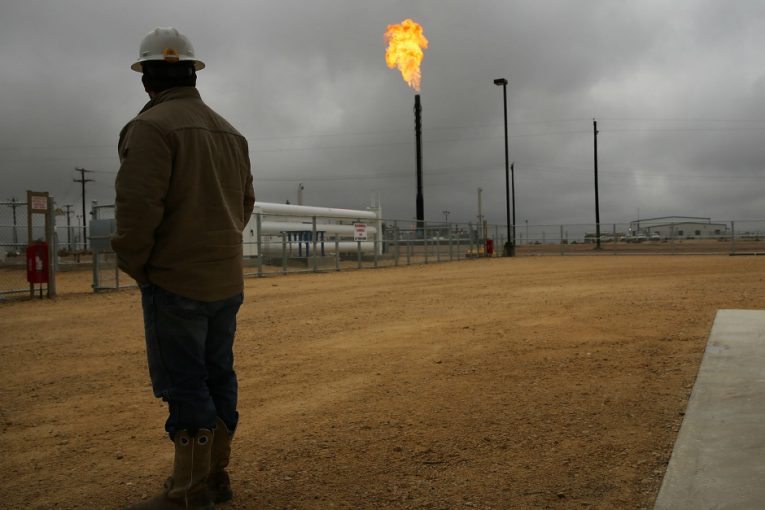
U.S. shale drillers are tapping on the brakes in the wake of a growing investor revolt that’s held down company values, even as they’ve scored historic production numbers.
The evidence is stacking up: The latest rig count showed the biggest one-week drop in the Permian Basin in 19 months, while Schlumberger Ltd. and Baker Hughes, the two largest oil service companies, blamed lacklustre earnings on the reluctance of North American explorers to boost their spending. At the same time, a Bloomberg Intelligence index of shale explorers showed shares have plunged 22 percent so far this year.
Producers from Exxon Mobil Corp. to ConocoPhillips are expected to post improved earnings next week. That’s not so much because things are looking up, but because they’ve learned how to do more with less, boosting well output with better technology and smarter planning. Investors now want to see it translated into better returns for them.
“It’s a conversation that management teams are hearing from all of their investors,” according to John Dowd, a portfolio manager at Fidelity Management & Research Co. The message: “It can’t be all about production growth,” he said.
For investors, the new mantra is returns, returns, returns. They want oil explorers to focus less on funding new wells and instead boost value for shareholders, Phillips Johnston, a Capital One Securities analyst, said in a note Friday.
It’s a slogan management teams are paying attention to. Some are exploring ways to change executive pay incentives that often reward growing oil production over profitability, said Dowd, who oversees funds worth $20.5 billion, including the $1.9 billion Fidelity Select Energy Portfolio.
The change is starting to show up in the oil fields, as well. More than 30 rigs across American shale plays have been idled since mid-August, including six this week in the Permian Basin in West Texas and New Mexico. That was the biggest one-week drop in America’s busiest oil field since March 2016.
As exploration and production companies report earnings in the next few weeks, investors should “expect heavy religion around capital discipline and focus on returns, with investors trying to gauge who is genuine vs paying lip service,” Johnston wrote.
A rise in oil prices should also help producers show shareholders they can profit more while spending less. The West Texas Intermediate crude benchmark averaged 7.3 percent more in the third-quarter than over the same period last year. That will probably be enough to offset lost output in the Gulf of Mexico and Eagle Ford shale in South Texas during Hurricane Harvey.
Skeptics remain, however. Hedge fund manager Jim Chanos, who’s shorting shale driller Continental Resources Inc., said independent explorers have been a bad deal for shareholders because they rely upon quickly depleting assets.
“Because the wells deplete so quickly, they constantly need to raise money to replace the assets,” he said in an interview last month. And Moody’s Investors Service, in a study of 37 drillers in the U.S. and Canada, found it will take oil consistently above $50 a barrel for their investments to pay off in the long run.
Baker Hughes and Schlumberger both saw their shares fall on Friday after they reported earnings. Lorenzo Simonelli, the Baker Hughes chairman and CEO, said in a statement that his company saw no meaningful increase in driller spending in the third quarter.
“We have seen some improvement in activity but we have not seen meaningful increases in customer capital commitments,” Simonelli said. “Our customers remain cautious.”
The oilfield services sector was the worst hit in the three-year crude-market crash. Contractors complained last year that prices for fracking were at unsustainably low levels, and vowed to raise them this year as oil prices inched upward. But investor dissatisfaction with explorer returns, despite the rise in production, has put a new spin on their priorities.
This was the first quarter in which Baker Hughes reported combined earnings with GE Oil & Gas since they were combined by General Electric Co. in July, a move creating the world’s second-largest servicer. The marriage, though, has gotten off to a rocky start, with Baker Hughes reporting results on Friday that missed analyst estimates.
The newly-formed company reported a net loss of $104 million or 24 cents a share. Excluding certain items, profit was 5 cents a share, worse than the 11-cent gain in an average of 23 analysts’ estimates compiled by Bloomberg. Revenue was $5.4 billion compared with the $5.5 billion average estimate.
Number one Schlumberger reported earnings Friday that were in line with analyst estimates. The company’s adjusted profit was 42 cents a share, in line with the average of 33 analysts’ estimates compiled by Bloomberg. Revenue was $7.9 billion, matching the average estimate, according to its statement.
Schlumberger is expected to boost earnings in the fourth quarter to 48 cents a share, excluding certain items, according to the average of 33 analysts’ estimates compiled by Bloomberg. However, CEO Paal Kibsgaard told analysts and investors on the company’s conference call Friday that the consensus estimate could be a bit on the high end.
Independent exploration and production companies began trimming their budgets in the second quarter and through the halfway point in the year had only spent 43 percent of their 2017 budgets, analysts at JPMorgan Chase & Co. wrote last month.
You can read more of the news on source
